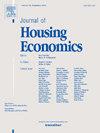Does flood risk affect property prices? Evidence from a property-level flood score
IF 2.4
3区 经济学
Q3 ECONOMICS
引用次数: 0
Abstract
One in six properties in England is exposed to flood risk and around half of those affected properties can be characterised as high risk. In this paper we examine whether the probability of flooding is capitalised in England's property market prices. We use unique property-level data from Rightmove, UK's no.1 property website and the property-level by Twinn, Royal HaskoningDHV. The latter is a metric of objective flood risk based on the likelihood of an individual property being flooded due to rainfall, overflowing rivers and tidal surges and is commonly used by UK lenders. By comparing the unconditional averages of our data, we find that properties at risk are sold at an 8.14 % discount compared to non-exposed properties, and the price discount increases to 32.2 % for properties with very high flood risk. By 2080 the flood events are expected to become more frequent and the average flood risk is projected to increase by 8 %. Our empirical model suggests that one percentage point increase in properties' flood risk is associated with a decline of 0.07 % to 0.11 % in both sold and asking property prices. The impact is higher for properties of which flood risk is expected to increase or for regions that have recently experienced a flood event.
洪水风险会影响房产价格吗?来自物业级别洪水评分的证据
在英格兰,每六处房产中就有一处面临洪水风险,其中约有一半的房产属于高风险房产。在本文中,我们研究了英格兰房地产市场价格中是否将洪水概率资本化。我们使用了英国第一大房地产网站 Rightmove 提供的独特的房地产级别数据,以及皇家哈斯康宁公司(Royal HaskoningDHV)Twinn 提供的房地产级别 FloodScoreTM。后者是一种客观洪水风险度量标准,基于单个房产因降雨、河流泛滥和潮汐涌动而被洪水淹没的可能性,被英国贷款机构普遍采用。通过比较我们数据的无条件平均值,我们发现与未暴露于洪水风险的房产相比,暴露于洪水风险的房产的售价折扣为 8.14%,而洪水风险极高的房产的售价折扣则增至 32.2%。到 2080 年,洪水事件预计将变得更加频繁,平均洪水风险预计将增加 8%。我们的实证模型表明,房产洪水风险每增加一个百分点,其售价和要价就会下降 0.07% 至 0.11%。对于洪水风险预计会增加的房产或最近发生过洪水事件的地区,这种影响更大。
本文章由计算机程序翻译,如有差异,请以英文原文为准。
求助全文
约1分钟内获得全文
求助全文
来源期刊

Journal of Housing Economics
Multiple-
CiteScore
3.30
自引率
4.20%
发文量
35
期刊介绍:
The Journal of Housing Economics provides a focal point for the publication of economic research related to housing and encourages papers that bring to bear careful analytical technique on important housing-related questions. The journal covers the broad spectrum of topics and approaches that constitute housing economics, including analysis of important public policy issues.
 求助内容:
求助内容: 应助结果提醒方式:
应助结果提醒方式:


